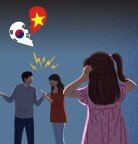Korean research papers cited more widely than Japanese theses
Korean research papers cited more widely than Japanese theses
Posted August. 11, 2022 08:00,
Updated August. 11, 2022 08:00
South Korea has overtaken Japan for the first time in the rankings of countries with the top 10 percent most often-cited research papers in the world.
According to indices on science and technology released by the Japanese Ministry of Education on Wednesday, Culture, Sports, Science and Technology, the Nihon Keizai Shimbun reported on Wednesday that South Korea and Japan ranked 11th and 12th, respectively, in terms of the number of research papers in the top 10 percent range that were cited academically in the world between 2018 and 2020. Compared to a decade ago, South Korea climbed two places from 13th while Japan went down from 6th to 10th place, allowing the latter to rank higher.
Japan, which ranked 10th, is still on a higher spot than South Korea (12th) in terms of the number of the top 1 percent most cited theses in the world. Compared to a decade ago, however, Japan declined from 7th while South Korea rose from 14th to 12th. The Japanese academic circle attributed a reduced global competitiveness of their research papers to lack of research management and skillful human resources.
China has topped the rankings in terms of both the top 10 percent most cited theses and the top 1 percent. China published 4,744 pieces that belong to the top 1 percent range from 2018 to 2020, exceeding the United States with 4,330 papers for the first time. The former (27.2 percent) also outdid the latter (24.9 percent) when it came to the occupancy rate of research papers cited during the same period. Last year, China surpassed the United States in terms of the number of the top 10 percent research papers.
The Nihon Keizai Shimbun reported that China invested 571 trillion won in research and development in 2020, 2.5 times up from 2010. Although investing less than the United States (697 trillion won), it is quickly catching up with its competitor at a rapid pace. Professor Keisuke Goda at Tokyo University analyzed that the Chinese political system will turn out to benefit technological development projects as it allows the nation to aggressively invest. However, he was concerned that Chinese leadership can hinder scientists from doing research with autonomy due to tight control.
Min Kim kimmin@donga.com







